The 2024 3MT Competition Winners: It’s a Tie!
Image Carousel with 7 slides
A carousel is a rotating set of images. Use the previous and next buttons to change the displayed slide
-
Slide 1: Dean Carlos Alonso gives opening remarks
-
Slide 2: Linhan Dong (GSAS) presenting
-
Slide 3: Bonnie Siegler (GSAS) presenting
-
Slide 4: Jenny Xiao (GSAS) presenting
-
Slide 5: Natalie Greaves-Peters (TC) post-presentation, relieved
-
Slide 6: Beatrice Bonini (Host), Mary Kate R. Dwyer (Audience Choice), Fitsum E. Petros (3rd Pl), Julia Davis-Porada (1st Pl), Gloria Huei-Jong Graf (1st Pl), Erin Louwagie (Host)
-
Slide 7: All 14 3MT presenters, all PhD students
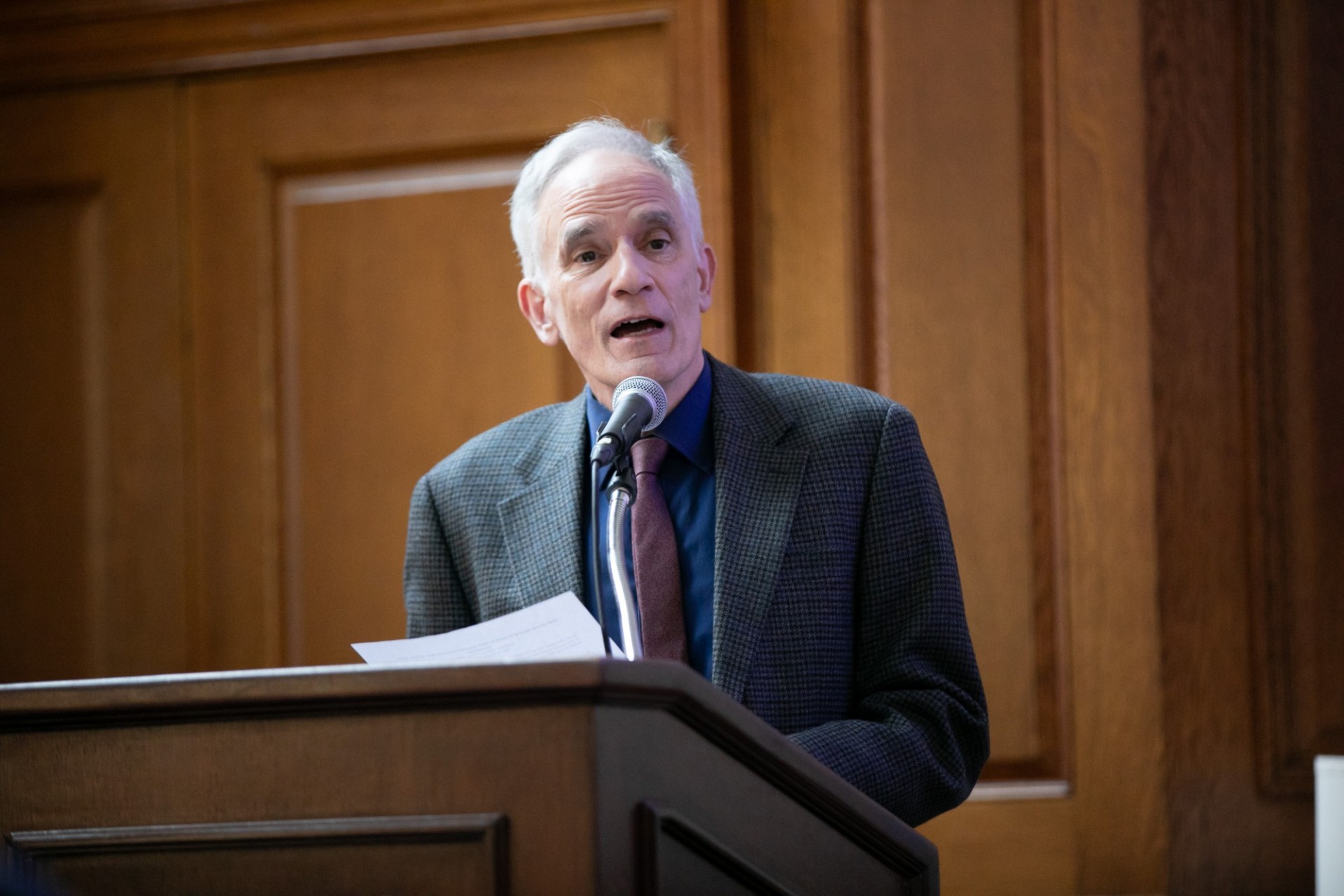
Dean Carlos Alonso gives opening remarks
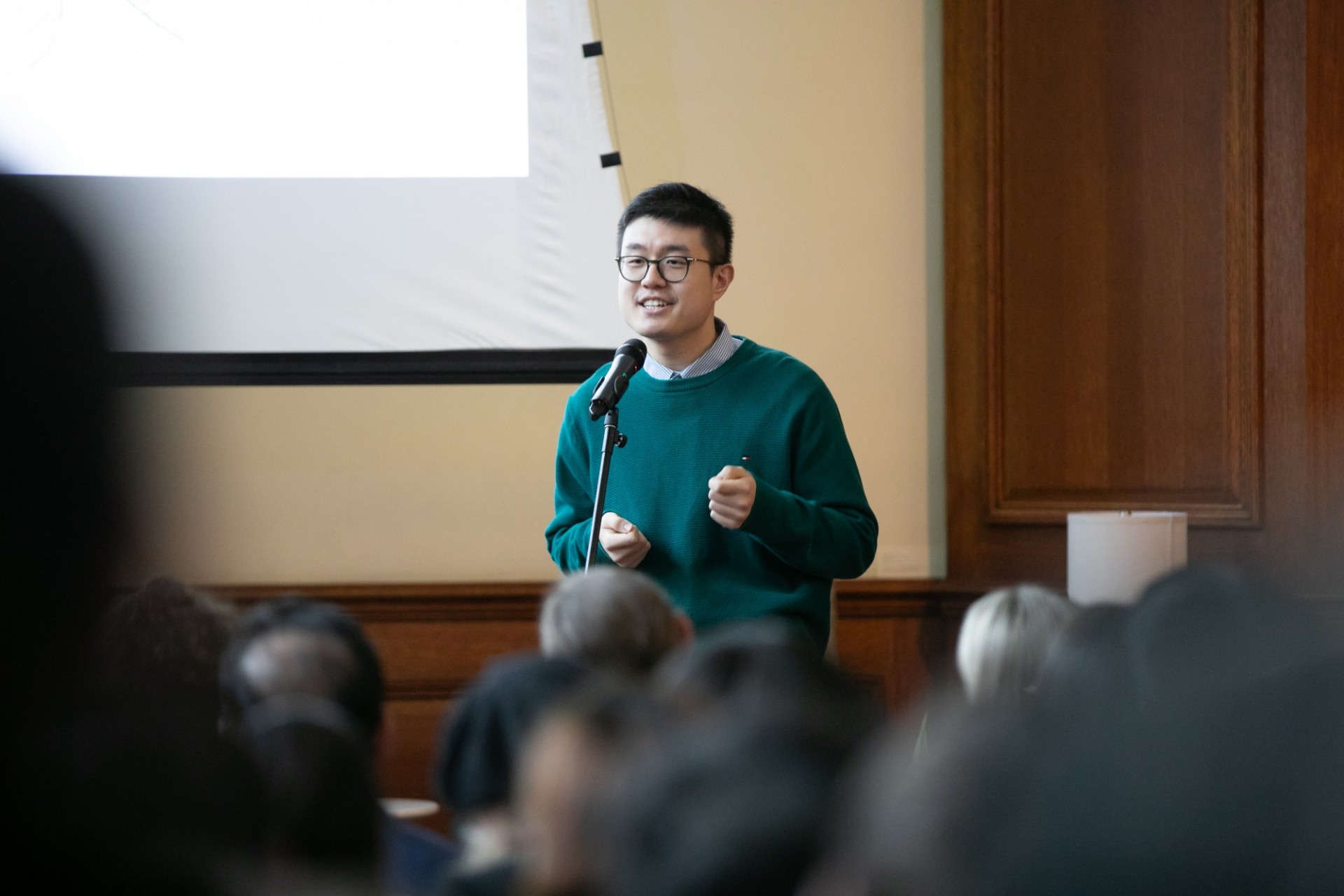
Linhan Dong (GSAS) presenting
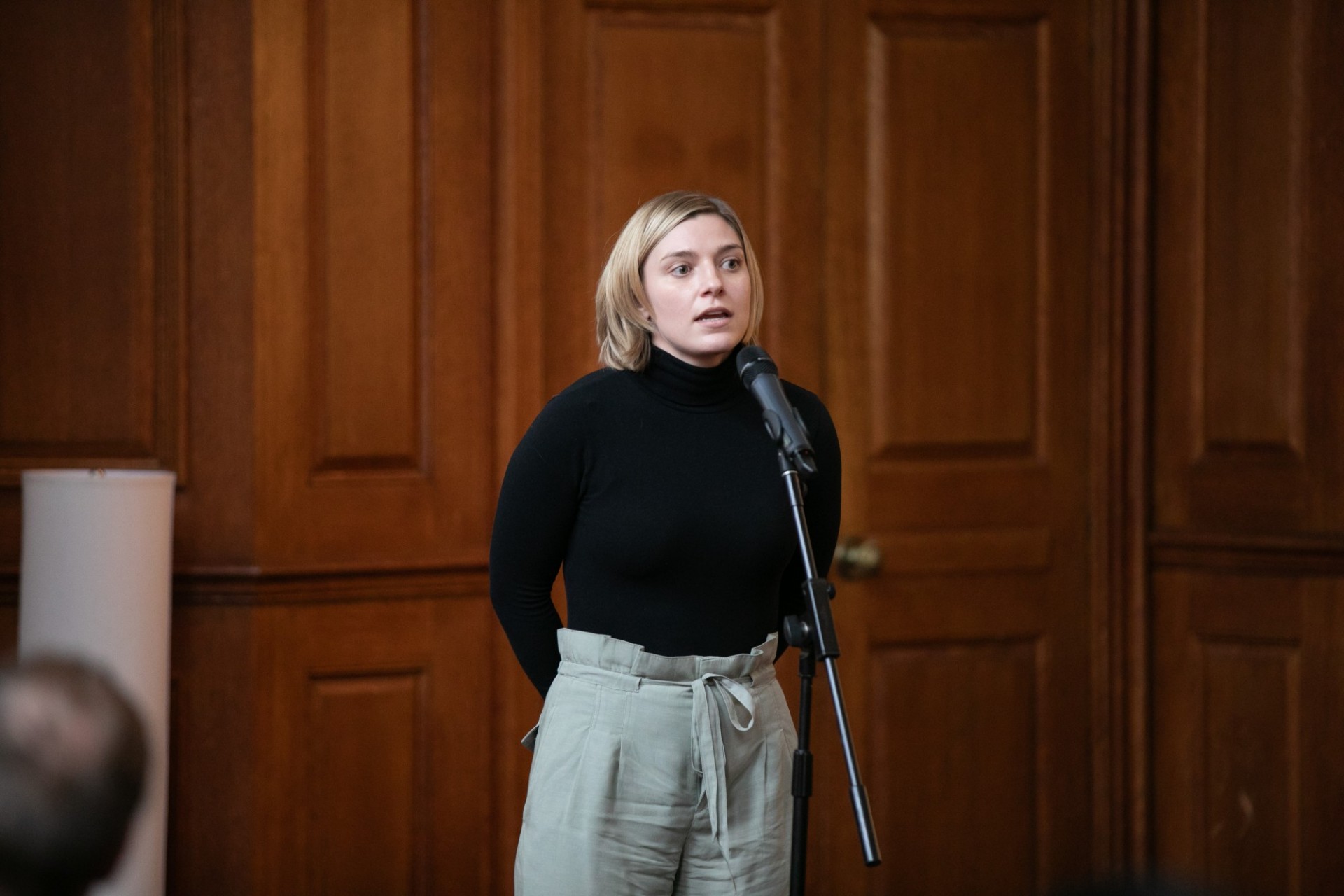
Bonnie Siegler (GSAS) presenting
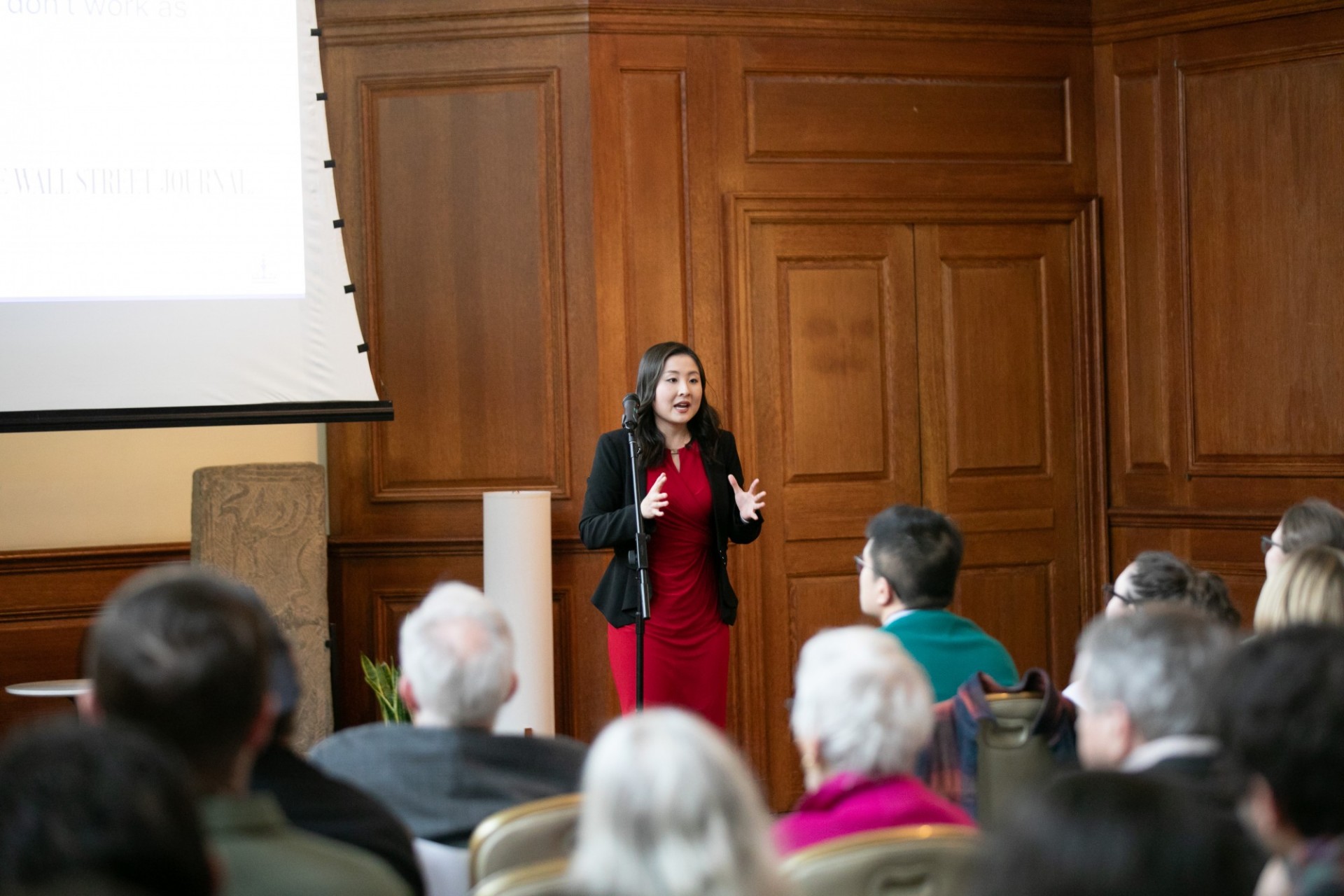
Jenny Xiao (GSAS) presenting
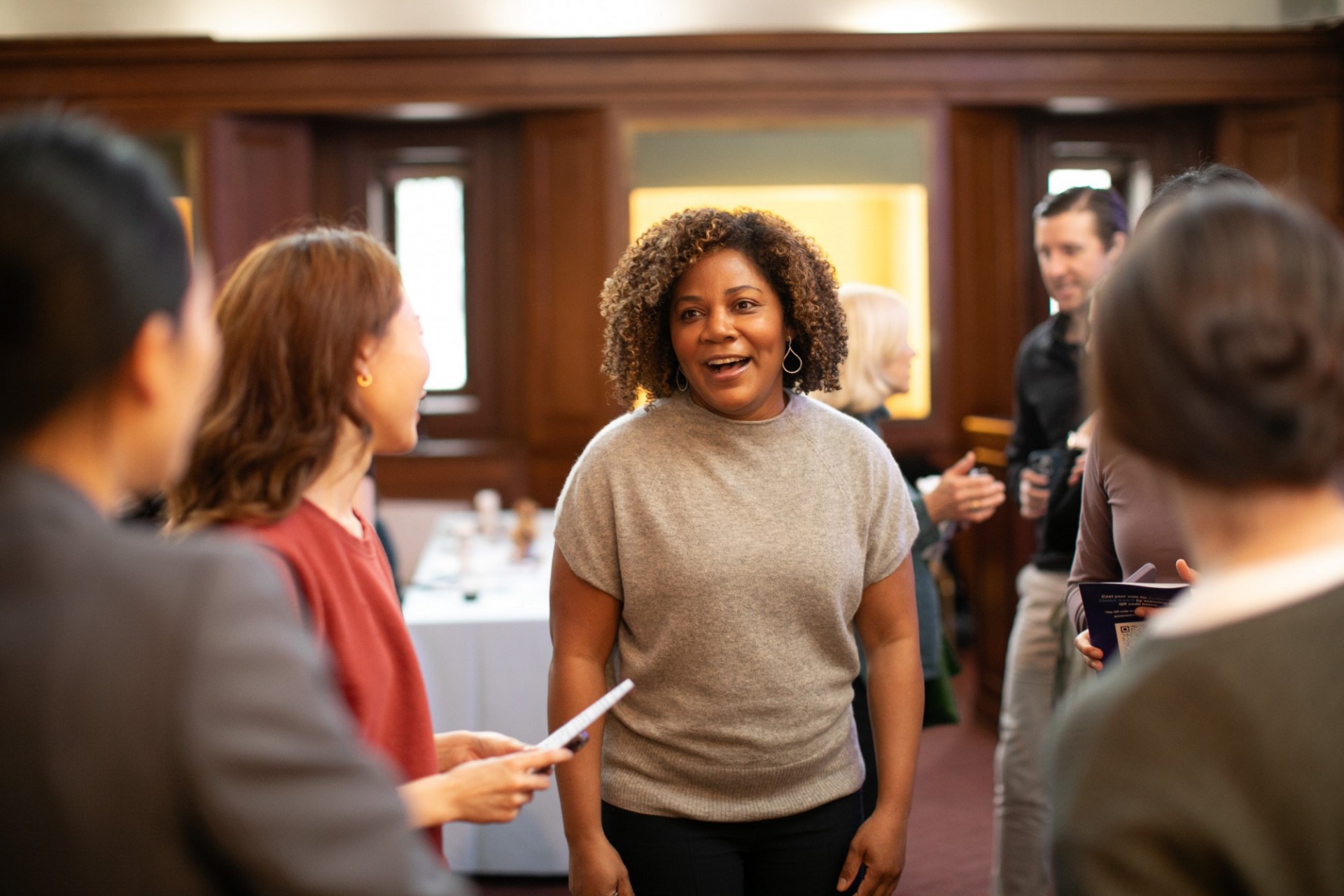
Natalie Greaves-Peters (TC) post-presentation, relieved
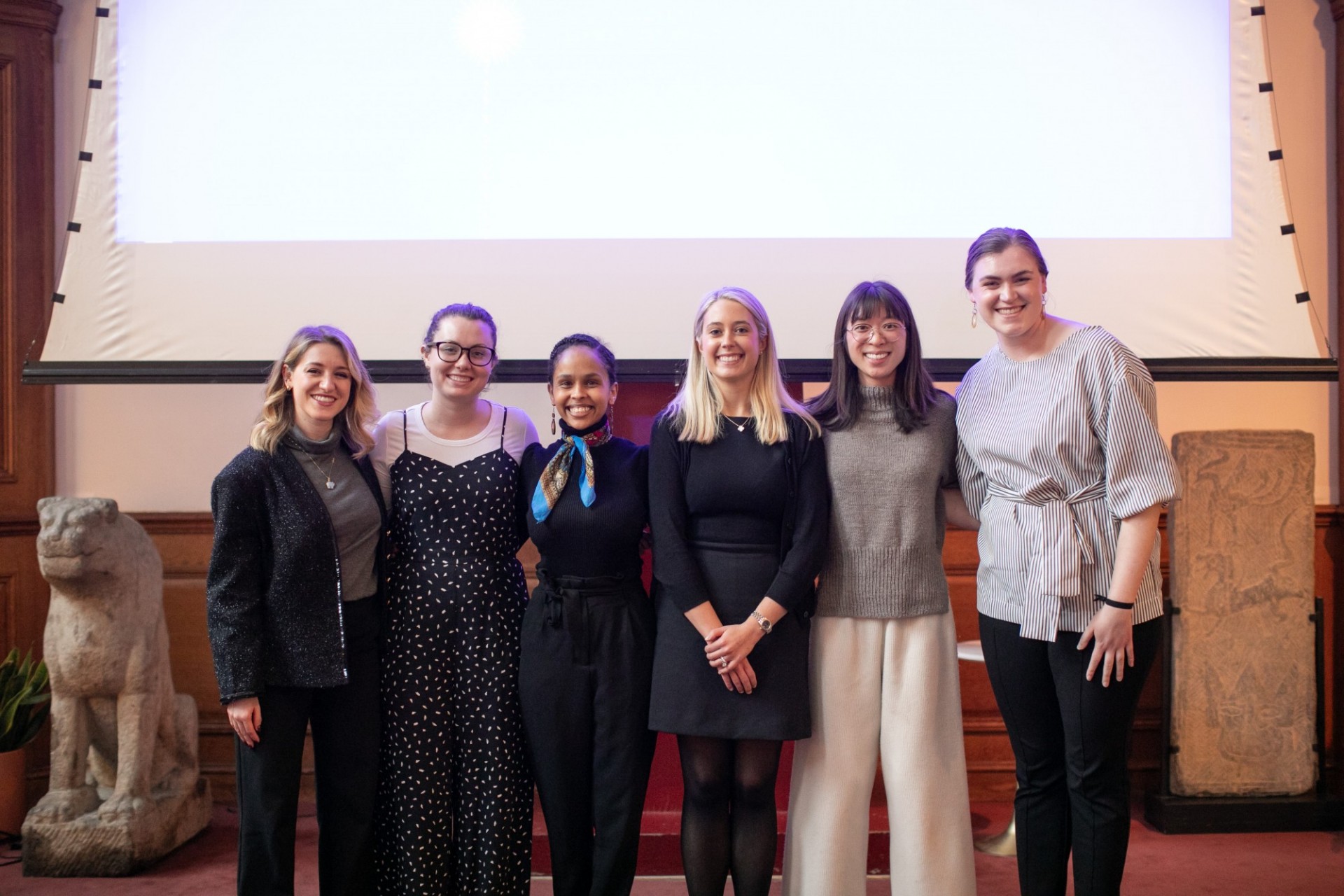
Beatrice Bonini (Host), Mary Kate R. Dwyer (Audience Choice), Fitsum E. Petros (3rd Pl), Julia Davis-Porada (1st Pl), Gloria Huei-Jong Graf (1st Pl), Erin Louwagie (Host)
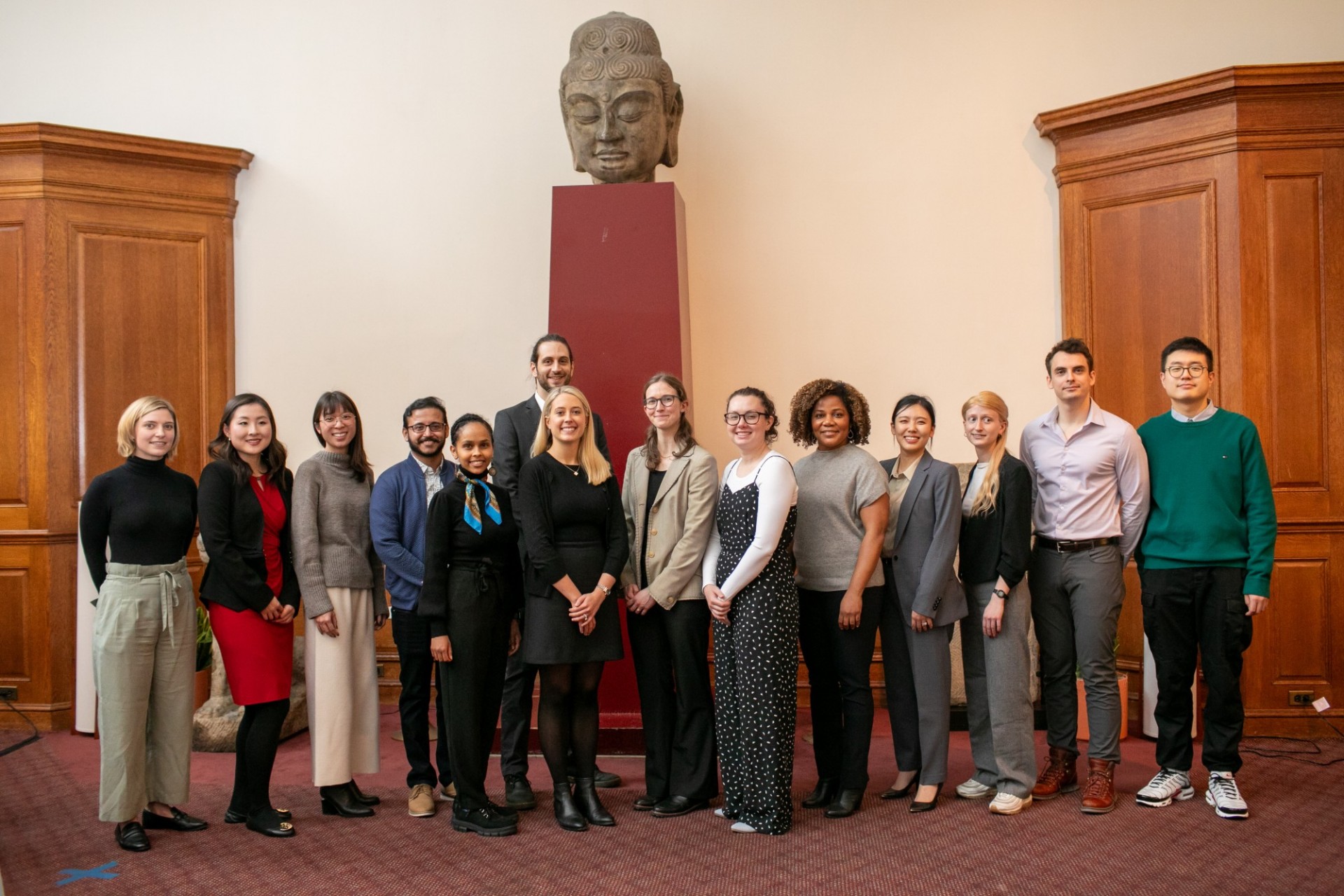
All 14 3MT presenters, all PhD students
On Thursday, March 7, fourteen doctoral students from across the university gathered in Low Library’s Faculty Room to showcase their research at the fifth annual Columbia University Three-Minute Thesis Competition. In three minutes, with the aid of just one slide and no notes, the students took turns presenting their dissertation research to a panel of judges—along with a live audience of students, staff members, and online watchers from all over the world.
The two emcees knew first-hand what the participants were going through. Erin Louwagie, a sixth-year PhD student in Mechanical Engineering (SEAS), was last year’s 3MT winner. Beatrice Bonini, a fourth-year PhD student in Political Science (GSAS) was a 2023 finalist. Beatrice, who is from Italy, told the crowd, “As a non-native English speaker, I truly valued being part of [the 3MT Competition], even though it put me out of my comfort zone. I truly loved the mix of challenge, learning, and entertainment that this competition entails.”
GSAS Dean Carlos Alonso, in his opening remarks, celebrated the fact that, “We have come together in the spirit of intellectual curiosity and scholarship to experience very different realms of knowledge. It is our job to listen, engage, and build bridges from our own knowledge to that which we are about to hear.” As promised, the presentations covered a wide range of topics: from school nutrition to language around race to retrieving minerals out of liquid brines. There were talks from the fields of marketing, computer science, mechanical engineering, and more. Some presenters used charts and diagrams to illustrate their research, such as Daniele Neri (Nutritional and Metabolic Biology, CUMC) on how to Fire Up your Metabolism: Disentangling Brown Adipose Tissue Regulation via Sympathetic Nervous System. Others had a slide with just one or two evocative photographs, such as Palash Badjatya, (Civil Engineering and Engineering Mechanics, SEAS) who explained how Fresh Cement Paste Behaves like the Human Body, and That Can Help Us 3D Print Buildings—and showed a beautiful photo of a 3D printed home. Each speaker did their best to pare down years of study into three minutes to instruct and delight a general audience.
After the presentations, the judges deliberated while audience members voted for their favorite 3MT talks. Participants were able to relax and reflect. Linhan Dong (Biological Sciences, GSAS), who presented Manipulating the Biological Clock to Disrupt Mosquito Biting, laughed, “It was more terrifying than I thought, but once I was up there, the stress receded away and practice kicked in.” Bonnie Seigler (Sociology, GSAS) gave a talk on Framing Racial Equity in US School Districts. “I struggle to explain my research to family and friends, so I thought this was a great opportunity.” As proof, Bonnie pointed out that her mom was in the audience for support. Another GSAS doctoral student, Jenny Xiao, gave her 3MT talk on US-China Relations in the Age of Artificial Intelligence. Jenny recommends 3MT for students “who want to learn how to quickly pitch their research and stand out as a PhD when competing for job opportunities.” Jenny had her suitcase packed to catch a flight home to San Francisco, but was waiting to hear the announcement of winners.
Mary Kate R. Dwyer (Biomedical Engineering, SEAS) won the Audience Choice Award for her talk Treating Traumatic Brain Injury with Synthetic Hormones. Then came an exciting twist: a tie for first place. The top prize was awarded to both Julia Davis-Porada (Microbiology and Immunology, CUMC) How Vaccines Generate Protective Immunity in Human Tissues and Gloria Huei-Jong Graf (Epidemiology, CUMC) for Fast Forward: Are 21st-Century Americans Growing Old before Their Time? Julia said that she prepared for 3MT by practicing while on the subway and walking around New York City. Gloria explained that she entered 3MT because, “I struggled to communicate my research topic, I would lose people getting into the weeds.” But clearly Gloria reached her audience that day.
The third-place award went to Fitsum E. Petros (Mechanical Engineering, SEAS) for her presentation, Unlocking the Secrets of Our Senses: An Integrated Approach to Understanding Human Balance & Movement. When asked about her prize, Fitsum was still recovering from her experience, “I don’t remember what happened on stage, but I’m glad they liked it!”
GSAS congratulates all of the 3MT’s fourteen finalists. The competition was co-hosted by the Graduate School of Arts and Sciences, the Fu Foundation School of Engineering and Applied Science, and the Coordinated Doctoral Programs in Biomedical Sciences.
Finalists:
Linhan Dong, Biological Sciences (GSAS)
Manipulating the Biological Clock to Disrupt Mosquito Biting
Mary Kate R. Dwyer, Biomedical Engineering (SEAS)
Treating Traumatic Brain Injury with Synthetic Hormones
Eliza Dach, Earth and Environmental Engineering (SEAS)
Switching up the Mineral Recovery Paradigm with Switchable Solvents
Julia Davis-Porada, Microbiology and Immunology (CUMC)
How Vaccines Generate Protective Immunity in Human Tissues
Natalie Greaves-Peters, Health Studies and Applied Educational Psychology (TC) Nourish Kids: Crafting the Gold Standard in School-Based Food & Nutrition Education
Sonia Seung-Eun Kim, Marketing (BUS)
The Power of Brands: How Liking the Same Brands Can Help Bridge the Ideological Divide
Daniele Neri, Nutritional and Metabolic Biology (CUMC)
Fire Up your Metabolism: Disentangling Brown Adipose Tissue Regulation via Sympathetic Nervous System
Bonnie Siegler, Sociology (GSAS)
Framing Racial Equity in US School Districts
Palash Badjatya, Civil Engineering and Engineering Mechanics (SEAS)
Fresh Cement Paste Behaves like the Human Body, and That Can Help Us 3D Print Buildings
Fitsum E. Petros, Mechanical Engineering (SEAS)
Unlocking the Secrets of Our Senses: An Integrated Approach to Understanding Human Balance and Movement
Gloria Huei-Jong Graf, Epidemiology (CUMC)
Fast Forward: Are 21st-Century Americans Growing Old before Their Time?
Daniel Mitropolsky, Computer Science (SEAS)
The Simplest Neural Model and a Hypothesis for Language
Kimberly Kroupa, Mechanical Engineering (SEAS)
Fingerprinting Your Cartilage Just Might Save Your Knees
Jenny Xiao, Political Science (GSAS)
US-China Relations in the Age of Artificial Intelligence
